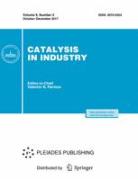Development and automation of algorithm for determining basis of nonlinear parameter functions of kinetic constants
https://doi.org/10.18412/1816-0387-2019-4-252-257
Abstract
Mathematical modeling of catalytic processes is necessary for the complete and accurate description, as well as for controlling the quality and physicochemical studied of catalysts. In the paper, theoretical issues of industrial catalysis are discussed. The work is devoted to theoretical graph analysis of informativity of kinetic parameters of the model of a complex chemical reaction. The aim is the development and automation of algorithm for determining basis of nonlinear parameter functions in solving inverse problems of chemical kinetics in order to define the number and form of independent combinations of rate constants of elementary stages. A program package for analysis of informativity of kinetic parameters of the mathematical model of a complex catalytic reaction is developed and described. The obtained functional relations between the kinetic parameters can be useful for experimentalists in physicochemical interpretation and analysis of mechanisms of chemical reactions. In other words, the proposed method allows independent combinations of kinetic constants to be distinguished that results in shortening the number of the model parameters and, as a consequence, enhance the accuracy of the mathematical model. The mechanism of hydrogen oxidation over a platinum catalyst is given as an example of the use of the software.
About the Authors
A. S. IsmagilovaRussian Federation
Z. A. Khamidullina
Russian Federation
S. I. Spivak
Russian Federation
References
1. Nancy J. Brown, Guoping Li // Int J Chem Kinet. 1997. Vol. 29. P. 393-414.
2. Pepiot P., Pitsch H. // Comb. and Flame. 2008. P. 67-81.
3. Valorani M., Creta F. // Comb. and Flame. 2006. V. 146. P. 29-51.
4. Gou X., Sun W. // Comb. and Flame. 2010. V. 157. P. 1111-1121.
5. Лебедев А.В., Окунь М.В., Баранов А.Е. и др. // Химическая физика и мезоскопия. 2011. Т. 13. № 1. С. 43—52.
6. Шакуров И.Р., Асадуллин Р.М. // Биофизика. 2014. Т. 59. № 2. С. 414—415.
7. Кудашев В.Р., Спивак С.И. // Теоретические основы химической технологии. 1992. Т. 26. № 6. С. 872—879.
8. Rao Sh., van der Schaft A., Jayawardhana B. // Journal of Mathematical Chemistry. 2013. V. 51. 9. P. 2401-2422.
9. Темкин О.Н. // Кинетика и катализ. 2012. Т. 53. № 3. С. 326—357.
10. Спивак С.И., Исмагилова А.С., Ахмеров А.А. // Системы управления и информационные технологии. 2014. Т. 57. № 3. С. 24—29.
11. Спивак С.И., Исмагилова А.С., Ахмеров А.А. // Химия высоких энергий. 2016. Т. 50. № 1. С. 8—12.
12. Khursana S.L., Ismagilova A.S., Akhmetyanova A.I. // Russian Journal of Physical Chemistry A. 2018. V. 92. No. 7. P. 1312-1320.
13. Вольперт А.И., Худяев С.И. Анализ в классах разрывных функций и уравнения математической физики. М.: Наука, 1975.
14. Хамидуллина З.А., Исмагилова А.С. Определение базиса нелинейных параметрических функций для сложных каталитических реакций: свидетельство о государственной регистрации программы для ЭВМ. ФСИС (Роспатент) № 2018614581, дата рег. 10.04.2018.
15. Крылов О.В. Гетерогенный катализ. М.: Академкнига, 2004.
Review
For citations:
Ismagilova A.S., Khamidullina Z.A., Spivak S.I. Development and automation of algorithm for determining basis of nonlinear parameter functions of kinetic constants. Kataliz v promyshlennosti. 2019;19(4):252-257. (In Russ.) https://doi.org/10.18412/1816-0387-2019-4-252-257
























